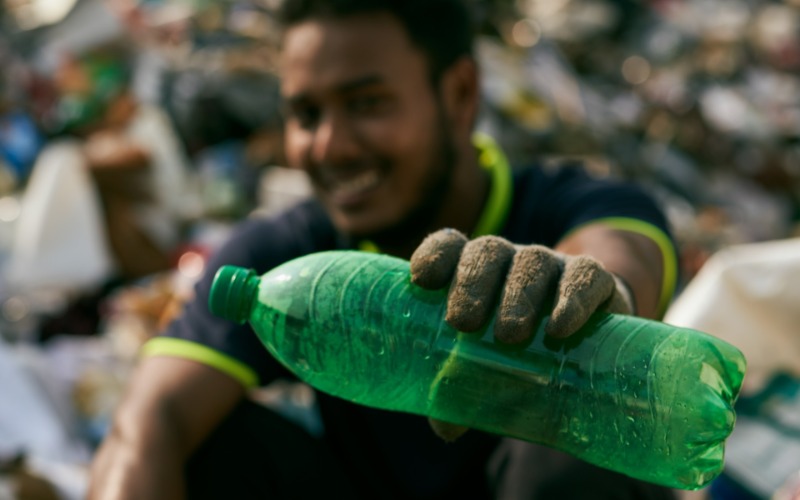The planet has a plastic problem. Every minute, one garbage truck of plastic is dumped into our oceans. This has to stop.
Plastic production is a major contributor to climate change, choking our water bodies, contributing to planet-warning emissions, and disrupting animal-marine-human life. Every single plastic bag ever produced still exists somewhere in our environment. If current trends continue, by 2050, our oceans could contain more plastic than marine life.
Why Go Plastic Free This July
Every day is a stark reminder of the urgent need to reduce our reliance on plastic and embrace sustainable alternatives.
The global trend of Plastic Free July helps consumers and brands with ideas for reducing their use of plastic at home and in their businesses.
It all started with Rebecca Prince-Ruiz visiting her local recycling center in Australia in 2011 and realizing that it was essential to reduce her waste and avoid single-use plastic in the first place rather than just filling her recycling bin every fortnight. The next month happened to be July, and that’s how Plastic Free July was born.
Since then, the movement has become a global phenomenon that helps millions of people and organizations be part of the solution to plastic pollution. Through collective action, individuals and businesses can restore hope for our world, leaving behind a cleaner, greener, and healthier planet for future generations.
Small steps can go a long way; by reducing the consumption of plastic products, we can prevent items from breaking down into microplastics and causing harm to our marine and wildlife ecosystems. Needless to say, a lot has changed over the years. We’re seeing a rise in single-waste plastic packaging avoiders — millions of people globally are changing how they consume products and manage their waste.
Consumers play an important role when asking brand owners the right questions about the products they are buying, such as is the plastic packaging necessary, what are the design alternatives for products, etc., as well as supporting brands that are taking up more sustainable initiatives.
We have the power to make brands make bigger changes. Research shows norms influence our behavior and impact others around us, creating new social norms.
By using a reusable cup in a cafe, carrying their own shopping bag or water bottle, choosing to reduce takeouts, shopping at farmers’ markets, or even switching to a bamboo toothbrush — people are taking — small but radical measures to start conversations and create connecting communities towards lasting environmental change.
How Can Brands Break Up With Plastics?
Time and time again, we have seen jurisdictions banning single-use plastics or brands switching their packaging because consumers asked for it, but the onus of creating impactful change shouldn’t be on the consumer. We need businesses and private and public institutions to help build momentum for systemic change.
Businesses can incorporate sustainability into their processes by focusing on investing in technology, product development, and new innovations to use more recycled plastic, redesign plastic packaging, and reduce their plastic footprint. Design and product development plays a critical role on the road to sustainable development and achieving a circular economy.
Essentially, we need to find better ways to develop products at the start of life of a product (when we start designing or manufacturing a product) so that it’s designed with the intent to be collected, recovered, recycled, or processed.
Apart from this, businesses need to focus on investing in technology and innovations to use more recycled plastic and reduce their plastic footprint as a whole. Furthermore, as brands are the larger polluters, they need to ensure they are able to incentivize the ecosystem to recover as much plastic they put out and go plastic-neutral while following the compliances laid out by governments.
Currently, we are seeing a lot of R&D going on with alternative materials to actually reduce the use of plastics; additionally, there is development taking place in the plastics space as well. Primarily across these four areas:
- Brands need to start thinking about how to make their packaging more efficient and recyclable. For example, when it comes to packaging technology, can they focus on packaging technology to make it monolayer so that it can be recovered and recycled more easily?
- Additionally, there is advancement across recycling technology so that once plastic waste is collected, it can be recycled in high-end recycled granules, which can be used back as raw materials in the supply chain of the brands that work with this.
- Additionally, there’s a lot of advancement taking place across business models, such as reuse, refillable, and return models. These innovative business models enable plastics to continue to stay in the ecosystem rather than using more resources.
- There is also technology being used to track and trace waste, which is what we are doing with ClimaOne — a revolutionary tech-enabled platform designed to transform the informal waste supply chain, wherein we bring full traceability, accountability, and traceability to brand owners who want to go plastic neutral while also using recycled plastic in their supply chain.
How Can Technology Revolutionize Plastic Waste Management?
One of the biggest challenges the waste ecosystem faces globally is a lack of tech-driven supply chains for waste elimination. We need to be able to track materials so they remain in the economy rather than end up in landfills and our oceans. Brand owners, collectors, and processors need full visibility of the waste supply chain, and analytics can bridge that existing gap.
Technology can enable seamless connectivity among stakeholders while simultaneously providing a transparent reverse supply chain for plastic waste and ensuring that collected plastic waste (right from collection until recycling) moves towards a circular economy. With data analytics, stakeholders are ensured better decision-making, transparency, traceability, and accountability in the resource value chain to handle plastic waste recovery efficiently and in a scalable way.
Brand owners who want to go plastic-neutral can gain full visibility of their waste supply chain using data as a strategic asset with instant reporting, visualizations, etc., enabling actionable insights. Furthermore, with tech-enabled features such as geo-tagging, location tracking, mobile applications, and optimization software, businesses can bypass local obstacles and uncover opportunities to co-create a sustainable future.
From Linearity to Circularity for Plastics
While everybody seems to be talking about sustainability and circularity, few understand what it really is. We need to move from linearity to circularity in thought, design, and process (all of which are currently overlooked); and shape a radically different future: one that’s restorative and regenerative. In order to drive change, we need to consider how we can invest in the “make, remake, reuse” shift to a circular economy.
When it comes to the circular economy — we can look at it this way — it should include technological solutions, economic, social, and environmental solutions in the context of circular economy, as well as social and ethical dimensions of how people live their lives. It can cover a broad scope, such as — products, infrastructure, equipment, and services, and applies to every industry sector.
The pressing need is progressive policy structures, which need to evolve with time and push incentives and subsidies for private players to set up the right infrastructure. Businesses, too, need to rethink their processes and models to drive widespread change. This needs to happen across industries wherein businesses adopt similar circular principles globally.











